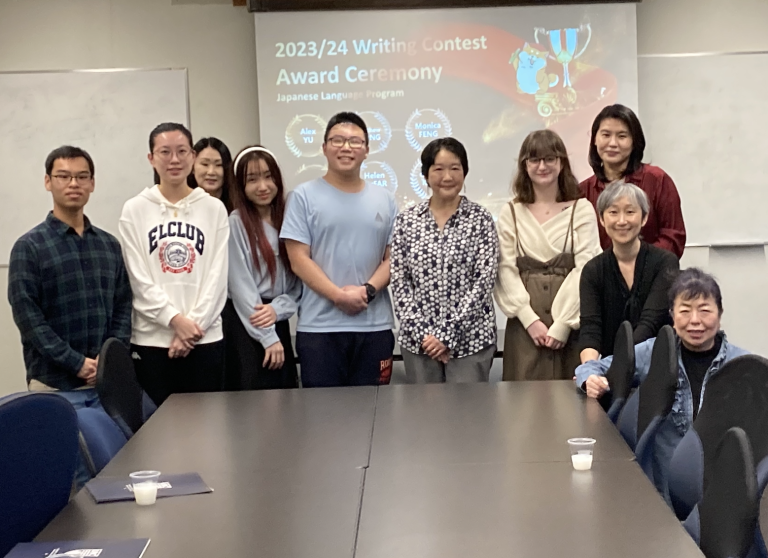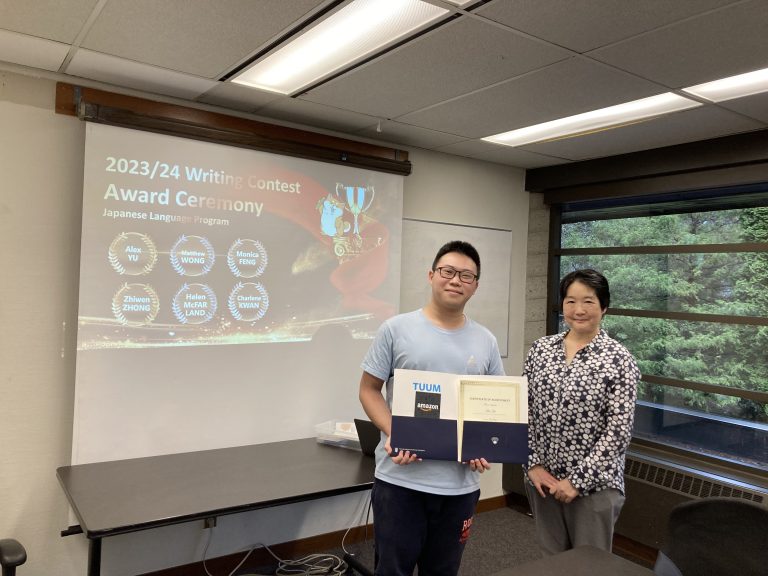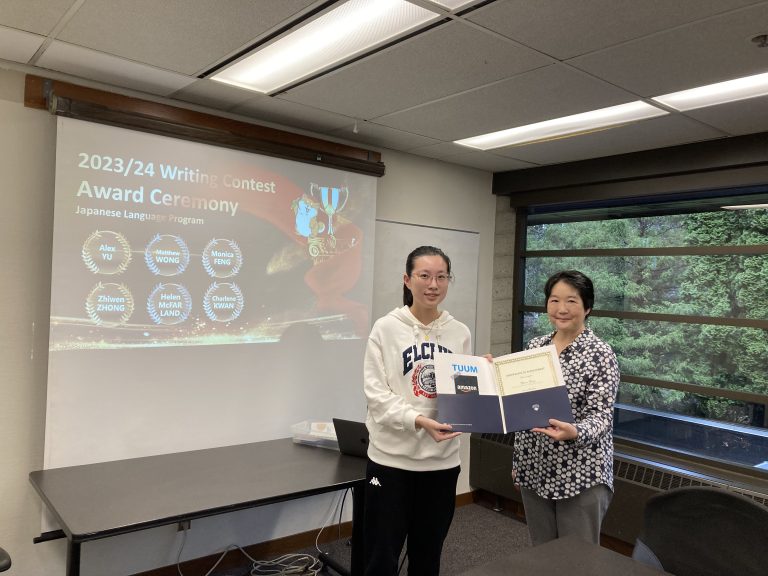

Winners at the awards ceremony with Ms. Kitayama Yen and the committee members
The UBC Japanese Language Program held the second essay and short fiction contest last year for all students who are enrolled in 2023 Winter Term. A total of 18 creative short stories and essays were submitted from the beginner to advanced level. Among all entries, six winners were selected by a panel of judges composed of Ms. Tomoko Kitayama Yen (Japanese Studies Librarian), Mr. Shota Iwasaki (Sessional Lecturer/PhD candidate), and the essay contest committee.
The awards ceremony was held on 29 January 2024 and each winner received the certificate and prize from Ms. Kitayama Yen. The winners were determined as follows:
Junior Category First Place: “ありがとう 白と黒の世界のガイドたち” by Alex Yu


Alex Yu (on the left) and Ms. Kitayama Yen (on the right)
Comments from the judges:
This delightful essay beautifully conveys the writer’s gratitude towards the ‘guides’ who introduced and nurtured their love for playing chess. The narrative unfolds seamlessly, exhibiting a clean and well-structured composition. The reader is left with an impression of a studious, earnest individual appreciative of the guiding influences that have shaped their lifelong endeavours. (Ms. Kitayama Yen)
This essay beautifully expresses gratitude for the author’s mentors of chess, portraying them as invaluable guides in a black-and-white world. The metaphorical journey to a black-and-white world, guided by the mentors, showcases a profound connection between learning, mentorship, and personal growth. The sincere appreciation for the mentors and the profound impact of chess on the writer’s life resonate deeply. Well done in conveying the theme through a personal and engaging narrative. (Mr. Iwasaki)
Comments from the winner:
“First of all, big thanks to all the organizers. Being part of this contest and exploring the field of Japanese writing was a memorable experience. This was a great opportunity to practice and improve my Japanese writing skills, and I learned a lot. I am also grateful to my family, teacher, senpai, and all my friends for teaching and supporting me along the way. Thank you!”
Junior Category Second Place: “床の反省” by Matthew Wong
Comments from the judges:
This entry captivates with its engaging narrative and emotional resonance. The writer skillfully navigates intricate emotions, crafting a fluid and concise composition. The personal depth is convincingly portrayed, culminating in a conclusion that enhances the essay’s overall beauty. The writer’s mastery of the Japanese language is notably advanced, showcasing an impressive vocabulary and adept handling of complex sentence structures. (Ms. Kitayama Yen)
This essay skillfully weaves a narrative around a sense of isolation, regrets, and longing for reconciliation with a lost loved one. The narrative’s depth and sincerity resonate, expressing the complex emotions associated with loss and reflection. Despite the melancholy, the writer’s gratitude for the lost loved one is beautifully expressed and shines through, conveying warmth in reminiscing moments shared. The essay’s sincerity and reflective tone make it a powerful exploration of gratitude amid heartache. (Mr. Iwasaki)
Junior Category Third Place: “私の人生で大切な物たち” by Monica Feng
Comments from the judges:
This essay explores the writer’s cherished sources of joy and solace, highlighting the significance of music and homemade meals. While some sentences could be improved upon grammatically, the overall presentation forms a coherent argument celebrating life’s pleasurable moments. The writer skillfully expresses the emotional connection to these ‘dear things,’ making the essay a heartfelt exploration of personal joys. (Ms. Kitayama Yen)
This piece beautifully explores the theme of gratitude, showcasing a deep appreciation for the various things that have supported the writer’s life. The writer skillfully highlights the role of music, finding solace and motivation in different genres, particularly piano music and K-POP group TWICE. Additionally, the essay expresses heartfelt gratitude for the comfort found in delicious food, particularly through the mother’s cooking. The sincere and relatable narrative effectively conveys the importance of these elements in making life more enjoyable. (Mr. Iwasaki)
Senior Category First Place: “苦しみを抱え、人生を抱きしめる” by Zhiwen Zhong


Zhiwen Zhong (on the left) and Ms. Kitayama Yen (on the right)
Comments from the judges:
This grammatically near-perfect essay delves into the role and meaning of suffering in one’s life. The author adeptly and convincingly presents the premise that suffering should be embraced and appreciated. Tackling a common human experience of suffering, the essay offers a courageous and hope-filled resolution, making it an admirable and thought-provoking read. (Ms. Kitayama Yen)
This essay presents a unique and profound perspective through the juxtaposition of medical treatment and the philosophy of living. It exhibits a logical structure and adept vocabulary choices, ensuring the clarity of ideas. The author emphasizes the importance of gratitude and acceptance of suffering as an integral part of life, instead of aiming to completely overcoming illness or life’s hardships. (Mr. Iwasaki)
Comments from the winner:
“Thanks to the Sakubun Contest, I was able to think deeply about what I should be most grateful for, and share my thoughts with others. I convinced myself of the importance of understanding suffering as a companion in life. Moving forward, I aim to continue facing suffering with hope and courage, striving for a richer life.”
Senior Category Second Place: “感謝の伝え方” by Helen McFarland
Comments from the judges:
This well-organized essay delves into the author’s journey learning kendō, a Japanese martial art, while exploring the nuances of expressing gratitude to one’s teachers. While the central theme revolves around the importance and challenges of gratitude, the narrative unveils the author’s earnest and honest approach to learning a new sport, showcasing emotional growth. It offers a lovely glimpse into the author’s transformative stay in Japan. (Ms. Kitayama Yen)
This essay is profoundly moving and original, based on the author’s experiences. The author articulates personal growth and gratitude through participation in a kendo club during the study in Japan. The writing is clear, with emotionally rich expressions, demonstrating effective language use. Particularly noteworthy is the reflection on how to express gratitude to the kendo instructor, adding depth to the final words of appreciation. This essay is a captivating narrative of vivid experiences of studying abroad that resonates with the reader, making it truly remarkable. (Mr. Iwasaki)
Senior Category Third Place: “900円で買った幸せ” by Charlene Kwan
Comments from the judges:
This heartwarming story beautifully captures the essence of family bonds and the importance of spending quality time together. The communication between the protagonist and his mother reminds us of the simple joys found in everyday moments and how precious the time we share with our loved ones can be. It is a truly heartfelt and accessible work. (Ms. Kaori Tanaka, Chair of the writing contest committee)
Thanks to many motivated students and their creative work, the Japanese writing contest was a great success. We would like to thank all the students who participated! The Japanese Language Program would like to thank Kitayama-sensei and Iwasaki-sensei for serving as judges for this contest.
We hope you all continue to enjoy studying Japanese and we look forward to seeing your entries in the next contest!


